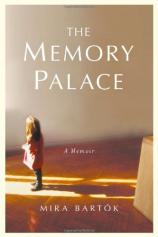Reading Group Guide
Discussion Questions
The Memory Palace: A Memoir

1. The prologue describes a homeless woman standing on a window ledge, thinking about jumping. The author writes,"Let's call her my mother for now, or yours" (p. xiii) How does imagining a loved one of your own in that position change the way you think about the book? Does it help you connect or make the situation more personal?
2. Early in the book, Mira sees her mother for the first time in seventeen years. What is your impression of this hospital visit? What impact does it have on Mira?
3. While their mother is dying at the hospital, Mira and her sister Natalia go through their mom's storage facility. How did it make you feel to be with the two sisters as they rummaged through the collection? What discovered or rediscovered items touched you most and why.
4. On page 29, Mira says,"Memory, if it is anything at all, is unreliable." How does Mira's own unreliable memory --- a lingering effect of her auto accident --- underscore the schizophrenic mind of her mother? Do you think it helps her relate to her mother? Why or why not?
5. Mira turns to art as a way to express herself. On page 53, when she visits a Russian Orthodox Church with her grandfather, she sees the"Beautiful Gate" of painted icons and wonders:"Can a painting save a person's life?" Describe ways in which art is therapeutic in this book.
6. As an illustration of how memory can be unreliable, Mira explains that she vividly remembers seeing the Cuyahoga River burning in Cleveland in 1969, and then admits that she's almost certain she wasn't really there, even though the memory of the event is so clear. Can you think of things that are imprinted in your own memory (perhaps from hearing family stories or seeing images onscreen) even though you were not there? Do you think anyone's memory can be an accurate record of truth? Why or why not?
7. In Italy, Mira takes a job making reproductions of old paintings for tourists. She later learns that they are being sold as authentic antiquities. How does Mira react to this news? What deeper feeling does it evoke in Mira about her life in general? How does this discovery fit into the book's questions about authenticity?
8. After visiting their father's grave in the New Orleans area, Mira and Natalia decide to visit a state park. Their heads and hearts filled with emotion, they get lost along the way. But after they find the park and enjoy some peaceful time in nature, the road away from the park seems clear and simple. Describe the role that nature and meditation play in Mira's life and in this book.
9. On page 238, when Mira's husband William is in a fit of depression, Mira feels like"It's January in 1990 all over again." Compare and contrast Mira's characterization of her husband and her mother. How do her experiences with her mother impact the way she responds to William's depression?
10. At her mother's memorial service, on page 295, the director of MHS (Mental Health Services, Inc.) says to Mira,"I know of children who have abandoned their parents for much less than you two have gone through," but Mira wonders if she and her sister truly did enough. How does this book make you think about the obligations that children have to their parents? Are there limits to what family members owe each other?
11. Mira seems to regard the homeless people she sees on the streets a little differently --- as though any one of them could be a mother or father. She wants people to understand the"thin line, the one between their worlds and ours" (p. 297). Has this book helped you see the homeless in a different light? Why or why not? How has it impacted the way you think about mental illness?
The Memory Palace: A Memoir
- Publication Date: January 11, 2011
- Hardcover: 320 pages
- Publisher: Free Press
- ISBN-10: 1439183317
- ISBN-13: 9781439183311







